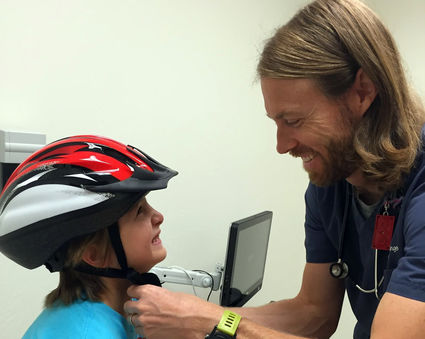Tour de France or neighborhood ride: wear your helmet
Last updated 7/12/2016 at Noon
Charlie Hastings, DO, fits a helmet on a child, something he does routinely in his practice.
Whether or not you’re following only the second Texan to compete in the prestigious Tour de France bicycle race (Lawson Craddock of Houston, after Lance Armstrong), the event is a good reminder of the importance of safe cycling. Tour competitors wear a helmet while riding. The physicians of the Texas Medical Association (TMA) encourage physical activity, such as cycling, and urge the use of a properly fitted helmet when doing so.
“I love cycling and love seeing kids, including my own, riding bikes (with helmets on),” said William (Charlie) Hastings, DO, a pediatrician in Spearman, a town on the northern edge of the Texas panhandle. “Bicycles are a great tool for exercise, transportation, relieving stress, and for just having fun. But as with all sports and activities, risks are involved.”
Each year in the United States, bicycle-related injuries send nearly 500,000 people to the emergency department, according to the Centers for Disease Control and Prevention. Injuries range from minor scrapes and bruises to severe head injuries and death. Head injury is the most common cause of death and serious disability from bike crashes.
"I have treated a lot of minor bicycle-related injuries, and a few more serious ones,” said Dr. Hastings, “and have experienced my share of injuries in 20 yearsof riding and racing bikes. If it weren’t for my helmet, a few could have been more severe.”
National statistics support this notion. Helmets have been shown to prevent nearly 85 percent of brain injuries, and can even help reduce injuries to the forehead and midface in crashes. To do their job, however, helmets must fit well and be worn low on the forehead just above the brow.
Dr. Hastings promotes helmet use and safety to young patients in his practice. “I commonly tell my patients we can fix an injured arm or leg a lot easier than an injured brain,” he said. Dr. Hastings also reminds his patients a head injury can occur even at slow speeds because the ground (especially paved surfaces) can be unforgiving. And with hands on the bike, breaking a fall can be difficult.
In addition to urging bike safety in his practice, Dr. Hastings recently fit helmets at a local TMA Hard Hats for Little Heads event and supports the program’s motto, “Get Moving. Stay Safe. Wear a Helmet.” The bike helmet giveaway program encourages helmet use when participating in sports on wheels: biking, inline skating, skateboarding, and riding a scooter.
TMA urges children and adults to wear the appropriate helmet for the appropriate sport, and ensure it is properly fitted and structurally sound. This TMA videodescribes how a helmet should fit for maximum protection. Wearing a helmet that is too big, too small, old, or unbuckled will not fully protect a head. Also, helmets wear out and should be replaced every few years, or when a child outgrows a helmet.
In addition to wearing a properly fitted helmet and other safety gear, Dr. Hastings says cyclists can decrease the risk of injury by keeping their bike well-maintained, wearing high-visibility clothing, and learning and practicing road safety.
While your rides might not take you the nearly 2,200 miles (3,535 kilometers) of the Tour de France, doctors say it’s always the smart decision to wear your helmet whether you’re riding to a friend’s house in your neighborhood or taking to the streets and byways.
Since the Hard hats for Little Heads program began in 1994, TMA has given away more than 240,000 helmets to Texas children.
TMA is the largest state medical society in the nation, representing more than 49,000 physician and medical student members. It is located in Austin and has 110 component county medical societies around the state. TMA’s key objective since 1853 is to improve the health of all Texans.
The TMA Foundation, TMA’s philanthropic arm, funds TMA’s Hard Hats for Little Heads program in 2016 with generous gifts from Blue Cross and Blue Shield of Texas, an anonymous physician and spouse couple, Make-A-Difference donors, the Baptist Health Foundation of San Antonio, individual physicians and their families, and other friends of medicine.















Reader Comments(0)